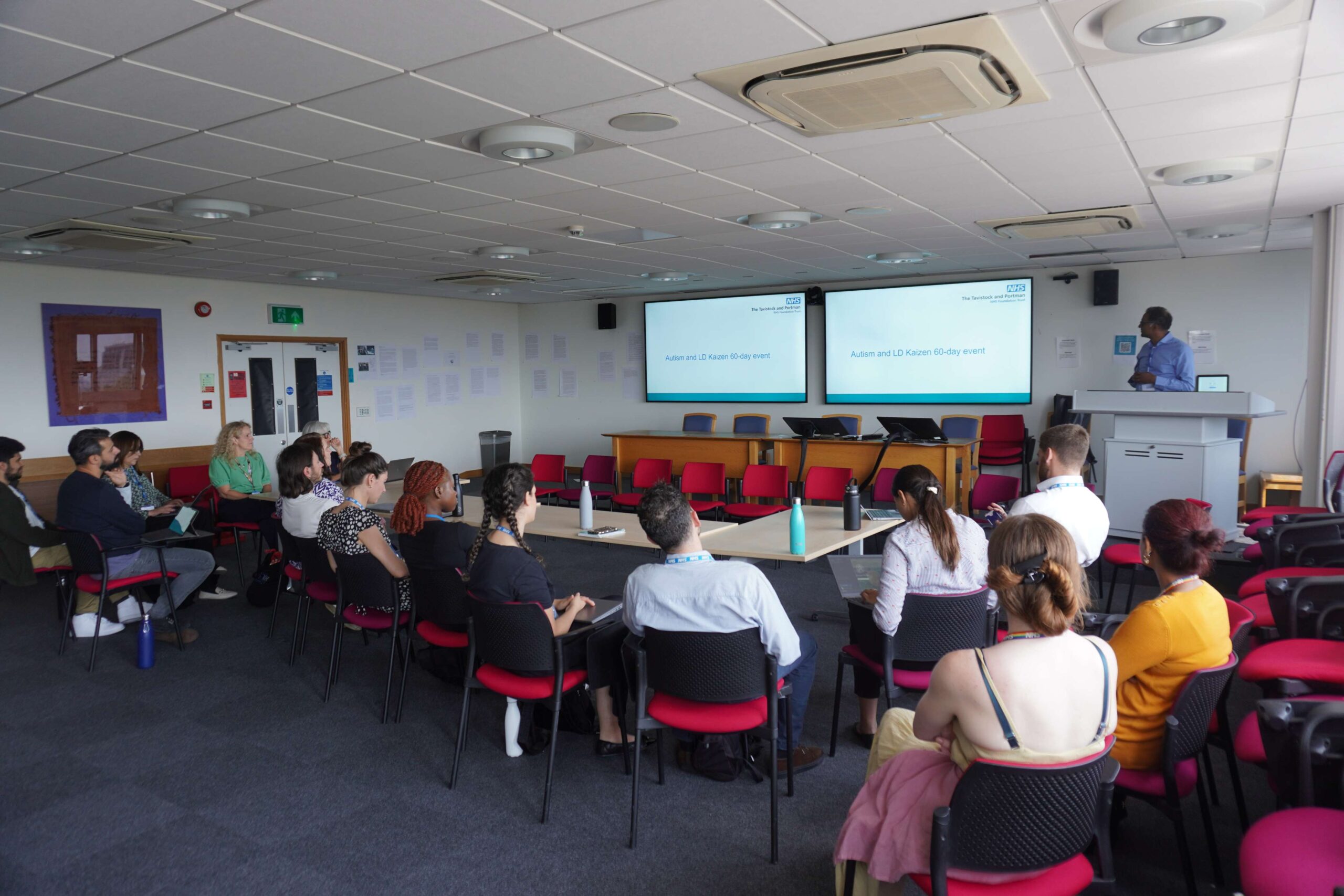
News
Kaizen QI success for Autism and Learning Disability Team
The Autism and Learning Disability Service Team‘s recent efforts to enhance service delivery culminated in a transformative Quality Improvement (QI) initiative, marked by a 90-day Kaizen event. This initiative, held recently, targeted three critical areas: triage process, report production, and missed appointments. The project set out to address inefficiencies in these areas, improving both the staff and service user experience.
Kaizen quality improvement philosophy
‘Kaizen’ is a Japanese portmanteau word, the combination of ‘kai’ meaning ’change’ and ’zen’, meaning ‘good’. This translates as ’good change’ and is synonymous with continuous quality improvement. The Kaizen philosophy is that everyone should be involved in improvement, from administrative staff to an organisation’s Chief Executive Officer.
Our Trust uses the Kaizen approach to run improvement events where the A3 improvement methodology is used. During Kaizen events, a team comes together to work towards agreeing on the areas of improvement the service needs.
A3 improvement methodology is a problem-solving and continuous improvement approach. The term “A3” refers to the size of the paper traditionally used to present information in a structured and concise manner. The A3 paper thus serves as a central document.
Kendra TyePage, Clinician Speech & Language Therapist, said:
“Through the Kaizen process our whole team was able to come together to redesign our triage process. We have been able to put this into practice, which has immediately had a huge impact on my time capacity and allowed me protected time to write reports. This protected time has improved my efficiency and really allowed me the headspace that I need to write complex and bespoke reports, as well as decreasing the wait time for patients receiving their reports.
Streamlining the triage process
The team made significant strides in optimizing the triage process. Previously, Assessment Leads were responsible for the triage process, a task that consumed valuable time, leaving them less able to focus on core clinical duties. The redesign of this process freed up their time, allowing for more efficient clinical work while maintaining patient clarity and understanding.
Key changes included:
- Shifting triage responsibilities away from Assessment Leads.
- Delivering best practice training on writing and structuring triage letters.
- Creating a clinic booking system for first appointments, reducing the administrative burden on clinicians.
- Standardising the response to patient queries about wait times and sending all patients an acceptance letter.
These measures not only streamlined triage but also contributed to increased clinician capacity for other critical activities.
Enhancing report production
The overhaul of the triage process also had a knock-on effect on report production, one of the most time-consuming aspects of patient care. By freeing up staff to focus on writing reports, the team significantly sped up the report creation process, improving the overall experience for staff and families.
To support these changes, the team introduced:
- Best practice templates to standardise and ease report writing.
- Centralised strategies and recommendations, making key information easier to access.
- New report templates integrated into the carenotes system by the Informatics team.
These improvements have reduced the time it takes for patients and their families to receive final reports, contributing to a smoother and more efficient care pathway.
Reducing missed appointments
Missed appointments, or did not attends (DNAs), have long been a challenge for healthcare services, impacting efficiency and patient care quality. As part of the Kaizen event, the team implemented several strategies to reduce DNAs and late cancellations, aiming for a target DNA rate of 5-7%.
Key initiatives included:
- Sending text message reminders two weeks, one week, and one day before appointments.
- Ensuring clinicians book appointments well in advance using the Carenotes system, allowing timely reminders to be sent.
- Establishing a clinic booking system for first appointments, which enabled administrators to quickly reassign slots in the event of cancellations.
These efforts not only reduced missed appointments but also increased the service’s overall quality and efficiency.
Dr. Myooran Canagaratnam, Consultant Psychiatrist, emphasised the value of the Kaizen process, stating,
The Kaizen process provided the team with a valuable regular protected space to come together and think about quality improvement – something that is difficult to achieve when the day-to-day demands on clinical and admin staff are so high. It was particularly helpful to have members of the executive leadership team present to provide the team with direct support at a senior management level.
Results and Impact
The changes introduced through this initiative have led to clear, measurable improvements across the board. By redesigning processes and reducing inefficiencies, the team has improved the quality of service, not just for the staff but also for patients and their families.
- Triage process: Clinicians have more time for direct clinical work, and patients feel more informed and listened to.
- Report production: Reports are being delivered faster, reducing patient wait times and improving their overall experience.
- Missed appointments: A reduction in DNAs means more efficient use of clinic time, helping the service run more smoothly.
The Autism and Learning Disability Team’s 90-day Kaizen event serves as a blueprint for how the Tavistock and Portman’s targeted and collaborative QI efforts can lead to meaningful improvements, especially regarding waiting list reductions and team efficiency – benefiting both staff and service users.
